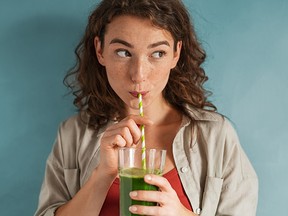Scientists say there is no compelling evidence to support the use of ‘detox’ diets for weight loss or toxin elimination

Recommended Videos
More recently, “a subset of the population has always held the belief that some sort of purification exercise is worthwhile, especially when they see celebrities and influencers promoting their own detox regimens,” Juurlink said.
But it’s never clear what, exactly, is purportedly being purged from bodies, Juurlink said. “People who market this stuff — naturopaths, homeopaths and alternative practitioners, including some physicians — rarely mention what specific ‘toxins’ they’re trying to get rid of, and one of the reasons they don’t do that is because they can’t.”
“By virtue of living on the planet we are exposed to all kinds of things, even when we live healthy lifestyles,” Juurlink said. “There’s this belief that these things somehow accumulate and that by engaging in rituals — a fast of some sort, or a coffee enema or taking some kind of herbal remedy — that you can purge yourself of ‘toxins’ and allow your kidneys or liver to work better.”
“There are a couple of topics I’m obsessed with. This is one of them,” said Timothy Caulfield, a professor in the faculty of law and School of Public Health at the University of Alberta. “It’s absolutely remarkable how enduring the appeal is.”

Why so seductive? Presumably because of their promise of “purification and redemption,” according to the 2015 review, “ideals that are deeply rooted in human psychology.”
Detoxes and cleanses appeal to our intuitive desire for simplistic solutions, Caulfield said. “It feels like they ought to work.” They also play to “fear and outrage,” he said. “This idea that there are toxins in the environment that we have to be afraid of and get out of our system, and that’s why we’re feeling sick.”
The allure continues to grow “because the marketing always relies on anecdotes,” added Caulfield, who once completed a severe, 21-day, Goop-endorsed cleanse for his book, Is Gwyneth Paltrow Wrong About Everything? When Celebrity Culture and Science Clash.
More alarming, juices used in “detoxes” or “cleanses” that haven’t been pasteurized or treated to kill harmful bacteria can make people sick, the complementary medicine body warned. Drinking large amounts of juices high in oxalate, like spinach and beets, can increase the risk for kidney problems.
“Some people think you can flush these non-specific toxins out of your body by just drinking lots and lots of water,” Juurlink said. In general, it’s good to maintain adequate hydration, he said. (He doesn’t want to be “too prescriptive,” but said somewhere in the order of six to eight glasses of water a day is sufficient, though some people require more, some less.)
In rare cases people can end up with water intoxication or water poisoning, leading to electrolyte imbalances and dangerously low blood sodium that in turn can cause swelling in the brain. “Even water in excess quantities can be harmful,” Juurlink said.
“My other worry is that people will sometimes take herbal products or traditional Chinese medications which themselves can have lead and other metals in them. Occasionally, we see someone who’s got a liver injury as a reaction to something they’ve taken from a herbalist.”
He’s particularly critical of doctors who are charging hundreds or thousands of dollars for chelation therapy, a system that flushes heavy metals from the body. “They’ll test patients. They’ll find high levels of metal in their urine and then they’ll propose a course of chelation therapy to help rid them of these metals.” But most people have elevated metals in their urine. “That doesn’t mean these things need to be removed from the body,” Juurlink said.
“Once in a while we’ll see a bona fide lead poisoning” because of high exposure to lead by virtue of a hobby or occupation, he said. These rare cases are best dealt with in hospital by someone like him, a medical toxicologist.
While most detox regimens are “pretty innocuous” there have been reports of people suffering intestinal perforations and infections from a practice like a coffee enema.
While it’s true that some foods can influence the activity of liver enzymes, “it doesn’t mean that those foods alter the elimination of toxins,” Juurlink said.
Words like “detox” and “cleanse” are a large part of the wellness discourse, Caulfield said. Promoters often escape regulation by avoiding making explicit health claims. Instead, they promise people are going to feel “more energized,” he said. “‘You’ll get those toxins out of you.’” Again, it’s all rather fuzzy which toxins, and how.
“What I often see is, ‘I totally agree with you that detoxes are bunk. But this detox works,’” Caulfield said.
“The other interesting part of this story? If you make fun of detoxing or cleansing, you’re the baddie. ‘Oh, so you’re pro-toxins? You’re for excess? You’re for bad food?’ Of course that’s not the case. People are trying to create a false dichotomy.”
During his cleanse, he starved himself for 21 days, lost a “ridiculous” amount of weight and immediately gained it all back. “You just cannot maintain this,” Caulfield said.
“The best diet is a healthy diet that’s sustainable and works for you. A severe detox or cleanse isn’t any of those things.”
National Post
Our website is the place for the latest breaking news, exclusive scoops, longreads and provocative commentary. Please bookmark nationalpost.com and sign up for our newsletters here.